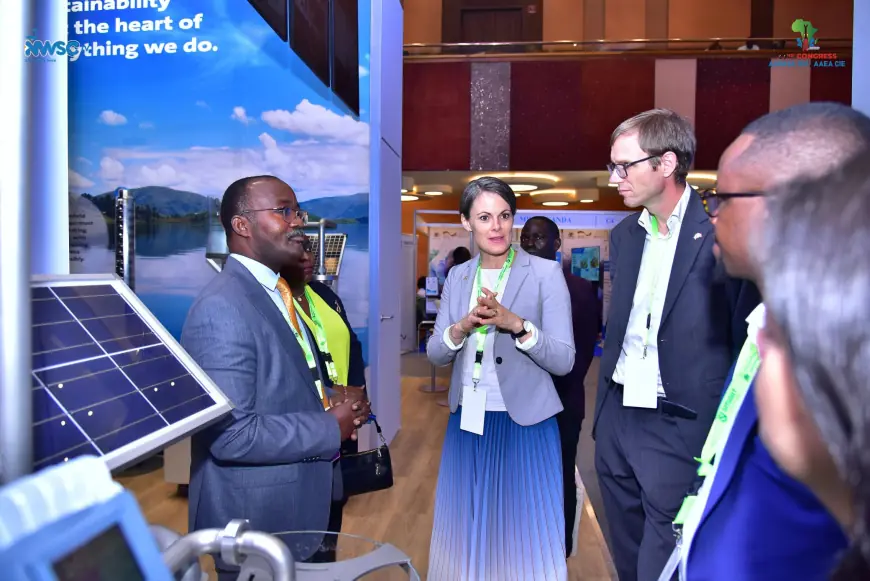Homegrown solutions & partnerships key for water access: AfWASA President Mugisha

The Managing Director of the National Water and Sewerage Corporation (NWSC), and The President of the African Water and Sanitation Association (AFWASA) Dr. Eng. Silver Mugisha, has emphasized the importance of collaboration within the water sector— highlighting the critical role of partnerships in achieving water and sanitation for all.
Speaking at the AfWASA International Congress and Exhibition 2025 in Kampala, Dr. Mugisha who is the AfWASA President outlined NWSC's strategic approach to partnerships and its ambitious goals for the coming years.
"Partnerships are not just beneficial, they are essential," Dr. Mugisha stated. "They enable us to share expertise, foster innovation, and increase our impact exponentially. We can achieve so much more together than we ever could alone."
The NWSC MD emphisized the diverse forms of collaboration, including strategic alliances, open innovation, and ecosystem partnerships, citing the importance of cross-industry dialogue between the water, energy, and environment sectors.
He stressed that partnerships enable the sharing of expertise, foster innovation, increase impact, and facilitate the scaling up of successful initiatives, while also building trust and legitimacy.
"Ecosystem partnerships, in particular, are vital," he explained. "They allow us to break down silos and address the interconnected challenges we face in a holistic way."
Detailing NWSC's operations, Dr. Mugisha noted that the publicly owned corporation serves 19 million people across 276 urban centers in Uganda, with a network spanning 23,500 kilometers.
He reiterated the utility's commitment to the "Water for All" agenda— emphasizing its focus on development and capital expenditure, and its drive for in-house innovation.
NWSC's strategic plan for the next five years includes ambitious targets, notably a significant increase in turnover and asset base by 2030.
Addressing the issue of non-revenue water (NRW), currently averaging 34%, largely due to challenges in Kampala, Dr. Mugisha acknowledged the need for improvement.
"We are working diligently to reduce non-revenue water," he affirmed. "While Kampala presents a significant hurdle, we are confident that we can achieve our targets."
NWSC also aims to reduce non-revenue water from 34% to 30%, maintain a customer satisfaction index of 80%, and increase its total asset base from UGX 4.5 trillion to UGX 6.2 trillion.
Dr. Mugisha showcased NWSC’s extensive international engagement, having partnered with organizations in 35 countries, including Australia, Austria, Angola, and several others.
He identified capacity development, targeted capacity development, and staff incentives as key components of successful partnerships.
He also emphasized the importance of regular performance appraisals, staff productivity, and individual/team accountability within NWSC.
"Our staff are our greatest asset," Mugisha emphasized. "We invest in their development and empower them to take ownership of their work."
The NWSC Managing Director explained that the corporation pursues a multi-faceted business strategy encompassing continuous re-engineering, asset management, and sustainable financial resources.
He noted that NWSC has successfully accessed funding from financial markets, highlighting its self-reliance and ability to thrive even without external aid.
"We appreciate aid, but we are not dependent on it," Mugisha asserted. "We are resourceful and can find ways to thrive even without it. This mindset has enabled us to secure funding from financial markets."
Dr. Mugisha pointed out that while the current tariff structure doesn't fully cover costs, it does cover all operating expenses and a portion of capital expenditure, with the aim of increasing cost recovery in the future.
He also underscored the corporation's commitment to continuous operational cost reforms, energy optimization through energy-efficient pumps, business process re-engineering, and cost containment.
Dr. Mugisha emphasized the crucial role of in-house IT solutions in driving efficiency and cost-effectiveness, noting that NWSC has developed its own billing, procurement, and human resource management systems.
He also revealed that the corporation is close to replacing its externally purchased finance management solution with an in-house version.
"We believe in leveraging technology to improve our operations and reduce costs," Mugisha explained. "Developing our own IT solutions allows us to tailor them to our specific needs and avoid expensive vendor lock-in."
The MD reiterated that partnerships and collaboration are essential for achieving water and sanitation for all.
He urged all stakeholders to work together, emphasizing the potential for shared learning and mutual benefit.












